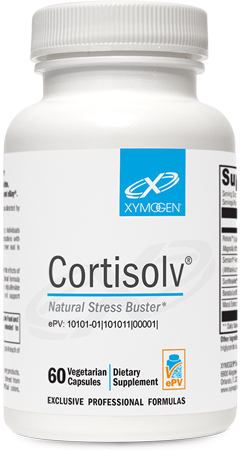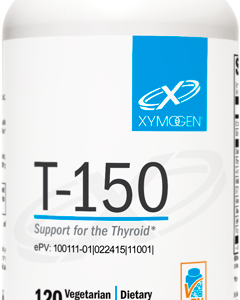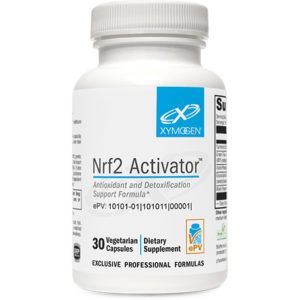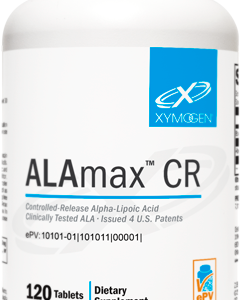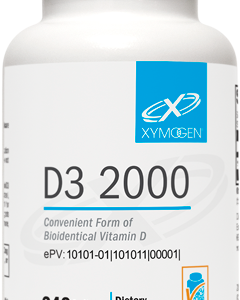Scientific Information/Data
CORTISOLV® is a multi-functional herbal supplement that has far-reaching and complementary benefits for individuals seeking help in dealing with everyday stress. It features a unique combination of clinically tested and patented ingredients, including Relora®, Sensoril®, and Suntheanine®, along with banaba leaf and maral extracts. Together, these herbs help the overstressed body and mind work toward their normal state of balance and resolve many of the biochemical changes that occur as a result of repeated, frequent exposure to stressors and cortisol.*
Relora® is a patented and proprietary blend of Magnolia officinalis and Phellodendron amurense bark extracts standardized to honokiol and berberine, respectively. These herbs have a history of traditional use in treating stress and occasional feelings of anxiousness. In modern times, they and their actives (honokiol and berberine) are used to support relaxation and reduce the perception of stress and stress-related eating. Rodent stress studies demonstrate a reduction in induced feelings of anxiousness.[1,2] Human studies demonstrate positive changes in DHEA (dehydroepiandrosterone) and cortisol levels, less weight gain (compared to controls), and reductions in perceived stress and transitory feelings of anxiousness in subjects taking Relora (500 mg to 750 mg for four to six weeks).[2-5] As an example, cortisol exposure and psychological mood states were studied in 56 subjects (35 men and 21 women) taking Relora (250 mg twice daily) or placebo. After four weeks of supplementation, salivary cortisol exposure was significantly (p<0.05) lower (−18%) in the Relora group compared to placebo. The Relora group also had significantly better (p<0.05) mood state parameters, including lower indices of overall stress (−11%), tension (−13%), anger (−42%), occasional fatigue (−31%), and confusion (−27%), and higher indices of global mood state (+11%) and vigor (+18%).*[3]
Sensoril® is an optimized ashwagandha (Withania somnifera) root and leaf extract that represents a major advancement in ashwagandha preparations. Sensoril’s proprietary and patented extraction process produces very high, powerful levels of stress-fighting, cognition- enhancing ashwagandha bioactive constituents. In fact, Sensoril is standardized to a minimum of 10% glycowithanolides. Sensoril’s excellent safety record is one of the most comprehensive of any ashwagandha ingredient sold.* Ashwagandha has been revered as an adaptogen for thousands of years. It is used to balance, energize, and revitalize the body and for its value as a cognition enhancer. Sensoril possesses multiple health benefits, and its superior efficacy has been demonstrated in randomized, double-blind, placebo-controlled human clinical trials.[6-10] The results of these trials revealed that Sensoril, taken in doses of 500 to 1000 mg/d, supported healthy cortisol and DHEA levels; enhanced working memory, reaction time, and cognitive capacity; improved auditory-verbal working memory; ameliorated negative changes in cardiovascular parameters associated with mental stress; and improved endothelial function and glucose and lipid metabolism.*
Suntheanine® is a pure form of L-theanine that is produced via a patented fermentation process, resulting in a 100% pure L-isomertheanine. Clinical research suggests that 50 to 200 mg/d of Suntheanine naturally stimulates activity in the brain known as alpha waves, which are associated with a relaxed but alert mental state.[11] L-theanine had significant anti-stress effects on experimental animals under psychosocial stress.[12] In humans, similar results were observed wherein L-theanine helped the body resist biochemical changes associated with stress. [13,14] In a randomized, double-blind, placebocontrolled trial, a high dose of Suntheanine (400 mg/d) given to boys, aged 8-12 years, improved aspects of sleep quality, including significantly higher sleep percentage and sleep efficiency scores as well as a non-significant trend for less activity during sleep.*[15]
Banaba Leaf (1% Corosolic Acid) and Maral Extracts Banaba leaf (Lagerstroemia speciosa) has a long history of use in folk medicine, particularly in Southeast Asia, as a glucose modulator. More recently, animal and human research on banaba leaf and its actives, including corosolic acid, suggest multiple mechanisms that influence glucose and lipid metabolism.[16,17] Furthermore, corosolic acid inhibits the enzyme that facilitates the conversion of cortisone to cortisol.[18] Maral extract (Rhaponticum carthamoides) has been widely used in traditional Siberian medicine, mainly to treat overstrain and common weakness resulting from illness. It has also been used historically as a stimulant and a remedy to support male sexual function.*[19]
The principal bioactive constituents of this plant are ecdysteroids, flavonoids, and phenolic acids.[20] A review of maral chemistry and pharmacology calls it an “adaptogenic herbal remedy.”[20] Furthermore, preliminary animal research suggests that maral lowers corticosterone levels and positively influences glucose and fat metabolism.*[19]
*These statements have not been evaluated by the Food and Drug Administration. This product is not intended to diagnose, treat, cure, or prevent any disease.
References
- Sufka KJ, Roach JT, Chambliss WG Jr, et al. Anxiolytic properties of botanical extracts in the chick social separation-stress procedure. Psychopharmacology (Berl). 2001 Jan 1;153(2):219-24. [PMID: 11205422]
- LaValle JB, Hawkins EB. Botanicals in dietary supplements: Stress and anxiety: the potential benefit of a proprietary combination of magnolia and phellodendron extracts. Dana Point, CA: Integrative Health Resources; 2013:1-15. http://www.nextpharmaceuticals.com/stage/pdfs/Relora%20Article-2013-LaValle.pdf. Accessed February 22, 2015.
- Talbott SM, Talbott JA, Pugh M. Effect of Magnolia officinalis and Phellodendron amurense (Relora®) on cortisol and psychological mood state in moderately stressed subjects. J Int Soc Sports Nutr. 2013 Aug 7;10(1):37. [PMID: 23924268]
- Garrison R, Chambliss WG. Effect of a proprietary Magnolia and Phellodendron extract on weight management: a pilot, double-blind, placebo-controlled clinical trial. Altern Ther Health Med. 2006 Jan-Feb;12(1):50-54. [PMID: 16454147]
- Kalman DS, Feldman S, Feldman R, et al. Effect of a proprietary Magnolia and Phellodendron extract on stress levels in healthy women: a pilot, double-blind, placebo-controlled clinical trial. Nutr J. 2008 Apr 21;7:11. [PMID: 18426577]
- Pingali U, Pilli R, Fatima N. Effect of standardized aqueous extract of Withania somnifera on tests of cognitive and psychomotor performance in healthy human participants. Pharmacognosy Res. 2014 Jan;6(1):12-18. [PMID: 24497737]
- Chengappa KN, Bowie CR, Schlicht PJ, et al. Randomized placebo-controlled adjunctive study of an extract of withania somnifera for cognitive dysfunction in bipolar disorder. J Clin Psychiatry. 2013 Nov;74(11):1076-83. [PMID: 24330893]
- Auddy B, Hazra J, Mitra A, et al. A standardized Withania somnifera extract significantly reduces stress-related parameters in chronically stressed humans; a double-blind, randomized, placebo-controlled study. JANA. 2008;11(1):50-56. http://www.lifeforce.net/pdfs/withania_review.pdf. Accessed February 23, 2015.
- Pingali U, Pilli R, Fatima N. Effect of Withania somnifera extract on mental stress induced changes in hemodynamic properties and arterial wave reflections in healthy subjects. Curr Top Nutraceutical Res. 2013;11(4):151-158. [on file]
- Pingali U, Fatima N, Kumar CU, et al. Evaluation of a highly standardized Withania somnifera extract on endothelial dysfunction and biomarkers of oxidative stress in patients with type 2 diabetes mellitus: a randomized, double blind, placebo controlled study. Int J Ayur Pharma Research. 2014;2(3):22-32. http://ijapr.in/ articles/research/231482.pdf. Accessed February 23, 2015.
- Nobre AC, Rao A, Owen GN. L-theanine, a natural constituent in tea, and its effect on mental state. Asia Pac J Clin Nutr. 2008;17 Suppl 1:167-8. [PMID: 18296328]
- Tian X, Sun L, Gou L, et al. Protective effect of l-theanine on chronic restraint stress-induced cognitive impairments in mice. Brain Res. 2013 Mar 29;1503:24- 32. [PMID: 23395732]
- Unno K, Tanida N, Ishii N, et al. Anti-stress effect of theanine on students during pharmacy practice: positive correlation among salivary α-amylase activity, trait anxiety and subjective stress. Pharmacol Biochem Behav. 2013 Oct;111:128-35. [PMID: 24051231]
- Yoto A, Motoki M, Murao S, et al. Effects of L-theanine or caffeine intake on changes in blood pressure under physical and psychological stresses. J Physiol Anthropol. 2012 Oct 29;31:28. [PMID: 23107346]
- Lyon MR, Kapoor MP, Juneja LR. The effects of L-theanine (Suntheanine®) on objective sleep quality in boys with attention deficit hyperactivity disorder (ADHD): a randomized, double-blind, placebo-controlled clinical trial. Altern Med Rev. 2011 Dec;16(4):348-54. [PMID: 22214254]
- Miura T, Takagi S, Ishida T. Management of diabetes and its complications with banaba (lagerstroemia speciosa l.) and corosolic acid. Evid Based Complement Alternat Med. 2012;2012:871495. [PMID: 23082086]
- Miura T, Itoh Y, Kaneko T, et al. Corosolic acid induces GLUT4 translocation in genetically type 2 diabetic mice. Biol Pharm Bull. 2004 Jul;27(7):1103-05. [PMID: 15256748]
- Rollinger JM, Kratschmar DV, Schuster D, et al. 11beta-Hydroxysteroid dehydrogenase 1 inhibiting constituents from Eriobotrya japonica revealed by bioactivity-guided isolation and computational approaches. Bioorg Med Chem. 2010 Feb 15;18(4):1507-15. [PMID: 20100662]
- Dushkin M, Khrapova M, Kovshik G, et al. Effects of rhaponticum carthamoides versus glycyrrhiza glabra and punica granatum extracts on metabolic syndrome signs in rats. BMC Complement Altern Med. 2014 Jan 20;14:33. [PMID: 24444255]
- Kokoska L, Janovska D. Chemistry and pharmacology of Rhaponticum carthamoides: a review. Phytochemistry. 2009 May;70(7):842-55. [PMID: 19457517]


